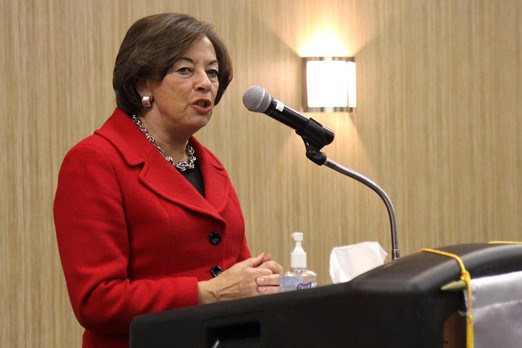THUNDER BAY -- Elizabeth Witmer admits there have been a lot of negatives when it comes to the Workplace Safety and Insurance Board.
The provincial compensation organization is facing $14.2 billion in unfunded liability, employers complain that premiums are high while injured workers argue that their claims aren’t enough.
But as the WSIB chair, Witmer, who took over that position on the board in May, said she is committed to creating a sustainable and fair system.
“How can we better serve injured workers? How can we improve our services? What can we do to ensure the sustainability of the system moving into the future,” Witmer said in Thunder Bay Wednesday morning after speaking with members of the chamber of commerce.
Getting workers treated as quickly as possible is one way to do that. And for injured workers in Northwestern Ontario, having a specialty clinic through the Thunder Bay Regional Health Sciences Centre is one way to do that.
While no one in the community showed interest in bringing a clinic to Thunder Bay the last time around, Witmer said she’s spoken to people now who want to get one going when another request for proposals goes out in 2014.
“I will do whatever I can to make it possible when and if we see that proposal,” she said.
Bob Hoffman, a worker representative at Resolute Forest Products in Thunder Bay said having a clinic here would be great.
Travelling to Toronto is expensive and sometimes, because of the nature of the injury, not possible for injured workers in the region.
“It will save definitely a lot of money,” he said.
But Hoffman is concerned that the WSIB are discussing changes. Usually when the board makes changes, it’s bad for the worker.
“I wanted to know what they employee can expect from these changes,” he said.
During a question and answer with Witmer, a man said that too often when a worker goes on compensation, they get comfortable at home and don’t want to return to work. Hoffman said that’s not true.
“They didn’t ask to get hurt. They don’t want to be at home,” he said. “It’s not a free ride for them.”
Witner said a balance needs to be found between the employer, the employee and the sustainability of the board. That’s why she’ll be hosting consultations in the new year.
